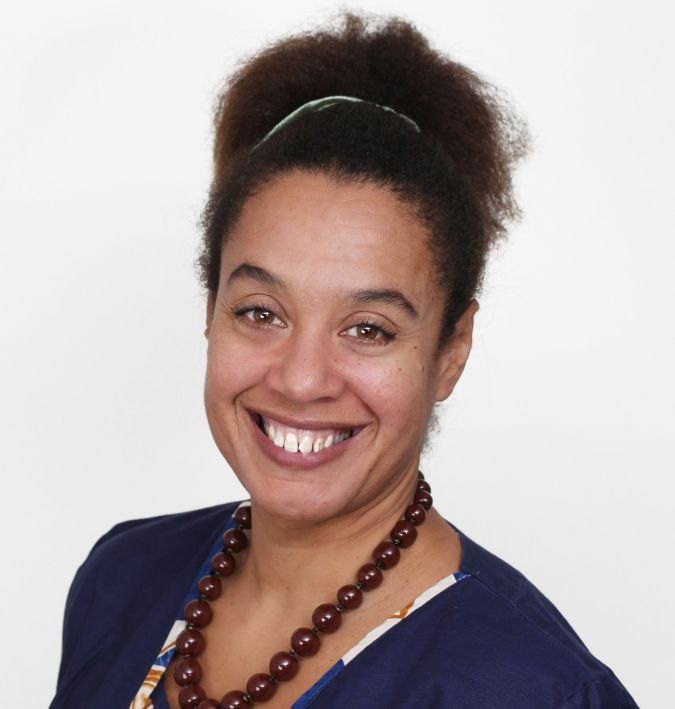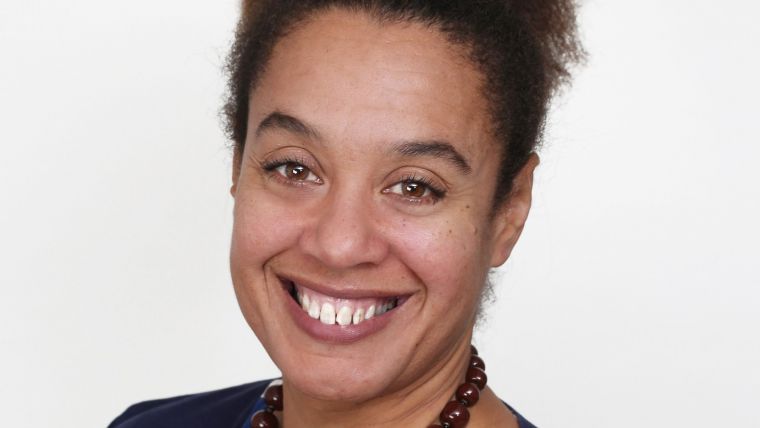Diane Dumashie Elected as New President of FIG
Dr Diane Dumashie won the final vote at the FIG Congress 2022 in Warsaw and will serve as the next president of FIG for the next four years. She stated that she is looking forward to four years of fruitful collaboration ahead, with this year’s successful edition of the FIG Congress as an excellent starting point. In an interview with GIM International earlier this year, Dumashie shone her light on the future of the surveying profession, the role FIG should play within the geospatial community and how our sector worldwide can be encouraged to become actively involved in solving the societal challenges with our knowledge and innovation.
How do you foresee the surveying profession changing?
As the biggest international society representing the geospatial and surveying profession, FIG offers a global platform of exchange and influence for our stakeholders. Over recent years, I’ve had the pleasure of holding the Council remit on some of the strategic stakeholder engagements and I can see that above all our profession needs to remain relevant, serve the public interest and leave no one behind in a world of rapid and dramatic change.
To continue to provide leadership in society we must be ready to innovate, to adapt and to lead the response to change. To remain impactful over the coming decades, our work will be shaped by the major global forces affecting societies. These include climate action, rapid urbanization, environmental and resource stewardship, technology revolution and demographic influences. By way of example on the how, I’ll draw on two of these forces.
First, the ongoing digital transformation. Our profession has been in transition for some time, but we can’t stand still; we must be prepared for the future by adapting now. Our societies are more connected than ever and geospatial is underpinning a lot of what we do as real-time services become society’s expectation and demand is growing across all our FIG professional disciplines. We do not have a monopoly over this abundant data that is richer and more complex than ever before, and we have to better appreciate that the increasing convergence between our sector and tech sectors is happening now and we must claim our relevance.
Second, adaptive organization and adaptive skills. Crucially, our profession crosses four generations. Those of us already in the workforce are now employed in ways we could have hardly imagined. Inevitably for our younger people, their work view has already changed. This was demonstrated in the round table of young professionals that I chaired at the FIG WW 2021 entitled ‘Reimagining the future of the surveying profession post 2020’. We are stepping-up to meet the challenge, but we need to do much more and we have to attract and develop talent with the key people skills to take up the ambassadorial, collaborative and engaging leadership roles of the future.
How will FIG continue to represent the interests of surveyors in the future?
FIG brings together the broad and diverse field of survey disciplines. Drawing on my history of senior roles in FIG, the best means to represent the diverse interest of surveyors is to ensure that FIG leads, listens and collaborates.
It is an imperative to bring positive changes to the built and natural environments in the face of global forces; we must be trusted by our stakeholders and society and as a sustainable 21st-century professional body. This raises the question whether our profession is prepared and resilient to engage in developing a better world for society and the planet.
Foremost, having chaired the FIG Governance Task Force ‘Our profession: Fit for the future in how we work and organize’ (FIG WW 2021), I have listened and learnt first-hand from FIG members about the increasing need and desire for resilience and sustainability within our profession. I can see that the ongoing geopolitical changes mean that our profession needs to maintain an influential voice at all levels to continue our beneficial society impact. It is imperative that FIG leads and advocates to raise awareness for our members to step up and respond to this impetus for change.

How would FIG contribute to the implementation of the SDGs under your presidency? How can surveyors and geospatial experts worldwide be encouraged to become actively involved in these goals?
The 2030 Agenda (SDGs) united global policy to transform the social, economic and environmental dimensions of humanity and our planet. Importantly, the UN mantra – to leave no one behind – highlights our own professional expertise in land and geospatial data seen in many of the SDGs.
2030 will soon be upon us, and meeting the goals requires ambition and leadership and a clear pragmatic plan. Taking action using the SDGs along with climate change action is underpinning everything we need to do now; to walk the path to climate equity we need action in cities and to secure and manage our planet’s natural resources.
Sustainability and resilience are not business as usual; there are readily accessible options with emerging innovative technology. Having been involved in the 2030 Agenda for over a decade, my presidency would advocate for an Environmental, Social and Governance (ESG) agenda. I’d seek to build on the very good work of the FIG Task Force on the SDGs2 to encourage speed and scaling up into our professional activities and to adopt a fresh view of the SDG project. Understanding the big agendas and proactively advocating issues allied to professional excellence is important, as explained in my webinar in the RICS Value the Planet series3 which concludes with actions that individual members can take in their own professional work.
What do you think of the current developments in land administration, fit-for-purpose, IGIF, FELA and so on? How can FIG play a role in this?
Land administration is at the heart of all FIG activities. As former Commission Chair and Chair of ACCO, I’ve seen clearly how this is addressed in various ways in all the FIG Commissions. Land Administration is the operational engine within Land Governance and is rooted in the cadastral area.
The recent developments in land administration are significant for managing the built and natural environment. The fit-for-purpose concept has been developed in recent years by some prominent members of the FIG community and provides an approach to closing the cadastral gap, especially in developing countries, by building frameworks that meet today’s societal needs. FIG promotes this, thereby supporting poverty alleviation, empowering the poor, and meeting the SDGs. The surveying profession will be the key custodians of maintaining and constantly improving such nationwide systems.
In the same way, FIG supports the work of UN-GGIM. The IGIF provides an operational framework for building such interactive data management systems, along with supporting the efforts of the UN-GGIM and the World Bank to develop the practical guidelines for implementation and economic impact assessments. FELA is a more general framework building on the same structure as the IGIF. FELA is a great framework for referencing and FIG encourages the building of comprehensive land administration systems.
Which main goals would you hope to see achieved during your presidency?
My agenda for action is underpinned by sustainability and resilience in the professional sphere and society space, to enable our professionals to take action on the most important issues of our time.
To navigate the decade of transformation, one thing is certain; we must act together. Given FIG’s unique structure with a GA of member associations, my overriding goal is to respond to the global challenges at both the council and national level. I’d also emphasise professional development, to be filtered back to the individual member associations for local implementation.
What is clear to me is the certainty about context and connectivity. I foresee this is a time of opportunity if we embrace the adaptability mindset. My headline goals include:
Climate action and the SDGs: Sustainable development is at the heart of developing resilience to climate change and achieving net zero emissions; Build on the importance of SDGs, poverty alleviation and social equality
Digital transformation: Claim our relevance in data and technology; Advance the role of the Geospatial Knowledge Infrastructure (GKI) in society and economy; Provide user-friendly, low-cost land administration and property systems
Community diversity and inclusion: Resilience of our profession for attracting new recruits, encouraging succession plans and upskilling all generations
Governance in the FIG organization: Member communication, collaboration and value added
As a global professional body, we need to respond to these challenges if we are going to ensure that our members deliver confidence in the years ahead. My tenure will work for:
- Clarity and collaboration;
- Purpose and reliability; and
- Action and courage.
About Dr Diane Dumashie
Dr Diane A Dumashie. FRICS, CEDR, Director of Dumashie Ltd; Trustee of LionHeart Benevolent Fund, RICS Standards and Regulation Board. A fellow of the RICS, Dumashie delivers strategic projects that have a clear social, economic livelihood agenda linked to land. Works in the UK and internationally helps the public sector and donor multilateral and bilateral agencies to generate benefits to society. Adept at enabling, facilitating and bringing people and resources together to achieve organizational objectives. Dumashie leads and innovates to manage change, energizes and resolves complex issues in the areas of land management, land administration, gender rights, land and coastal property regeneration. A passionate ambassador of professional development, Diane has throughout her career held voluntary roles to serve the profession worldwide.
References:

Value staying current with geomatics?
Stay on the map with our expertly curated newsletters.
We provide educational insights, industry updates, and inspiring stories to help you learn, grow, and reach your full potential in your field. Don't miss out - subscribe today and ensure you're always informed, educated, and inspired.
Choose your newsletter(s)












